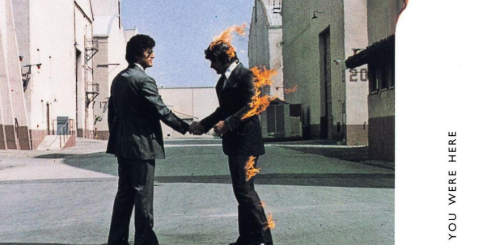The Fletcher Memorial Home by Pink Floyd Lyrics Meaning – A Lyrical Dissection of Political Satire and Historical Commentary
- Music Video
- Lyrics
-
Song Meaning
- Peeling Back the Cynicism: The Visceral Imagery of Power’s Playground
- A Roll Call of Infamy: Unpacking the List of Notorious Guests
- The Dark Comedy of Reality’s Reflection in Entertainment
- Apocalyptic Undertones and the ‘Final Solution’: Unearthing the Song’s Hidden Layers
- The Violently Joyless Games of War: Dissecting Memorable Lyrics
Lyrics
And build them a home, a little place of their own.
The Fletcher Memorial
Home for Incurable Tyrants and Kings.
And they can appear to themselves every day
On closed circuit T.V.
To make sure they’re still real.
It’s the only connection they feel.
“Ladies and gentlemen, please welcome, Reagan and Haig,
Mr. Begin and friend, Mrs. Thatcher, and Paisly,
“Hello Maggie!”
Mr. Brezhnev and party.
“Who’s the bald chap?”
The ghost of McCarthy,
The memories of Nixon.
“Good-bye!”
And now, adding color, a group of anonymous latin-
American Meat packing glitterati.
Did they expect us to treat them with any respect?
They can polish their medals and sharpen their
Smiles, and amuse themselves playing games for awhile.
Boom boom, bang bang, lie down you’re dead.
Safe in the permanent gaze of a cold glass eye
With their favorite toys
They’ll be good girls and boys
In the Fletcher Memorial Home for colonial
Wasters of life and limb.
Is everyone in?
Are you having a nice time?
Now the final solution can be applied.
Pink Floyd’s ‘The Fletcher Memorial Home’ carries a weight that resonates through the decades since its release on the band’s 1983 album, ‘The Final Cut’. This song goes beyond mere lyrics into a scathing indictment of historical leadership and the persistent follies of global politics. The track, woven by Roger Waters’ slashing pen, turns a mirror on society, reflecting the grotesque visage of power without empathy.
Unlike many of Pink Floyd’s other songs notorious for their cryptic allusions and metaphysical musings, ‘The Fletcher Memorial Home’ is starkly direct. Waters addresses the mechanizations of the political elite with biting cynicism, and the song carries its message on an uncomfortably familiar note that urges listeners to consider the absurdities of history’s grand narrative.
Peeling Back the Cynicism: The Visceral Imagery of Power’s Playground
The opening lines usher us into a bizarre nursery for the power-hungry giants of the 20th century. Waters suggests a ‘special place,’ a ghastly retreat for those who’ve dabbled in tyranny and waged war at the expense of humanity. By beckoning these ‘overgrown infants’ to their tailor-made memorial home, the lyrics strip these leaders of the dignity often afforded them by history books, reducing them to petulant children, disconnected from reality within the confines of their closed-circuit world.
The imagery here is evocative and deliberate: leaders are infantilized to underscore their ineptitude and moral irresponsibility. Placed within the ‘permanent gaze of a cold glass eye,’ these figures become subjects under scrutiny, suggesting that they should be observed for the phenomena they are—relics of a past that humanity should learn from, rather than vestiges to aspire to become.
A Roll Call of Infamy: Unpacking the List of Notorious Guests
Waters doesn’t shy away from naming names. The ‘Fletcher Memorial Home’ hosts an uncomfortable reunion with the likes of Ronald Reagan, Margaret Thatcher, and Leonid Brezhnev, to name a few. Inserting these historical figures, including infamous symbols like the ghost of McCarthy and memories of Nixon, the song becomes a direct commentary on the moral failings and aggressive foreign policies of these leaders.
The inclusion of these names draws a line in the sand, a distinction between those in power and the average person, between those who enact policies and those who live (and die) by their consequences. By dropping these names into the mix, Pink Floyd isn’t just critiquing individuals; they’re critiquing an entire epoch of Cold War bravado and neocolonial misadventures.
The Dark Comedy of Reality’s Reflection in Entertainment
The sardonic proposal for these leaders to ‘appear to themselves every day on closed-circuit T.V.’ is a mockery of media and self-obsession. It highlights how far removed they are from the masses, wallowing in self-admiration and delusion, all the while maintaining an image for public consumption. This line points to a deeper truth about the nexus between politics, entertainment, and the media, and how these spheres have combined to craft public perception over time.
Waters cuts deep, implying that the closed-circuit consumption turns these leaders into little more than living caricatures, sustained by the feedback loop of their insular world, removed from the blood and soil realities of their policies. It’s a chilling take on political leaders whose consequences reverberate in the hearts and homes of the populace, while they remain untouched and unfazed.
Apocalyptic Undertones and the ‘Final Solution’: Unearthing the Song’s Hidden Layers
The Floydian nightmare isn’t just an indictment of decades past but suggests an ongoing pattern, an inescapable waltz with death and destruction. When Waters ominously asks, ‘Is everyone in? Are you having a nice time?’ the tone shifts from criticism to a haunting prophecy. The inquiry itself rings macabre, as if Waters is finalizing a list before a dread event, a nod to the ‘final solution,’ a term infamously associated with Nazi genocidal policies.
This is no thinly veiled allegory but a sledgehammer of poignant historical associations. In the context of the Falklands War, which was contemporaneous with the album’s release, these lines paint a stark picture: history is doomed to repeat its darkest hours if humanity does not confront the horrors of its leaders’ actions head-on.
The Violently Joyless Games of War: Dissecting Memorable Lyrics
Amid the particularly biting lines, ‘Boom boom, bang bang, lie down you’re dead’ stands out for its trivialization of warfare. The sing-song cadence mimics the simplicity and ingenuousness of a child’s game, yet it belies the torment and bloodshed associated with real-world conflicts. This juxtaposition forces listeners to confront the frivolity with which life is often gambled away in the chambers of power.
These lines serve as a condemnation of wars as wasteful ‘games’ that offer leaders a playground on which to flex their muscles, devoid of any compassion or respect for life. Through this lens, Waters contends with the inherent desensitization to violence and the casualness with which the world, at times, views war. It’s a sobering reminder that behind the strategic maneuvers and victories declared in political warfare, there is nothing but loss, grief, and irrevocable damage imposed on human lives.








